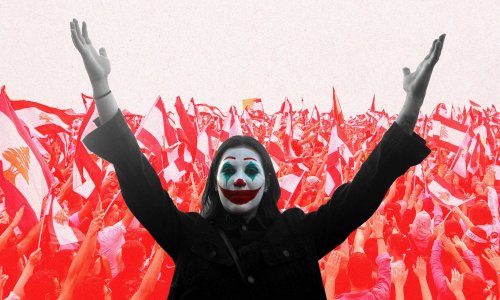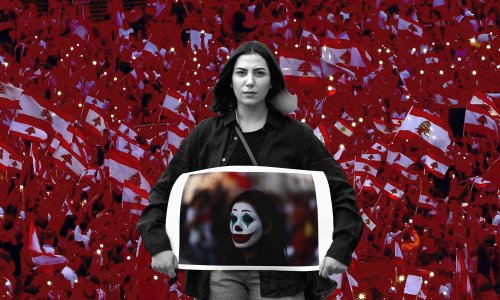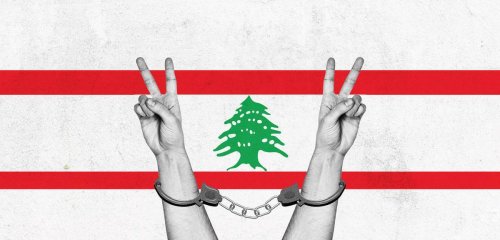The burglary at the mansion of Lebanese super star Nancy Ajram which resulted in the death of the intruder, at the hands of Ajram’s husband is the talk of the town. Shot 16 times, the burglar was identified as “a Syrian” only, as if that was enough to condemn him. The public is still digesting the crime, and the theories in circulation, including that he might be a disgruntled employee. By contrast, issues of race, gender and colour do not capture the Lebanese’ attention nor do they get the same attention span.
A similar racism filled incident slipped the attention of most Lebanese, as they become more and more indulged in the day to day developments of their revolution and the controversy surrounding it.
The incident was a sketch on the popular show Menna w Jerr hosted by Pierre Rabbat. The show, to be fair, is the first of its kind with around 6 co-hosts, something that could arguably make it stand out in comparison to popular shows of the same genre. Now what was really distinctive about that particular episode was the level of cultural illiteracy that the producers of the show have conveyed particularly that of its host and co-hosts that remained silent with the exception of one.
The “funny” sketch is aimed at portraying the rather good financial situation of domestic workers as they are getting paid in dollars, while Lebanon reels from a stagnating economic situation with a shortage of US Dollar bank notes, and so the storyline goes. Comedian Nady Abou Chabke impersonates a migrant domestic worker, wearing a “maid outfit” with braided hair, talking in broken accent with her “master”. When the sketch ends, everyone claps except Bassem Youssef (the guest), who just couldn’t let it pass without making a critique of this sketch which came across as a covert rebuke.
The Lebanese are preoccupied with a “Syrian labourer” Mister Nancy Ajram shot 16 times, they are laughing at African and Asian maids demanding Dollar bank notes on TV drama. Do the Lebanese understand the level of racism they exhibit while doing #thawra?
His reaction was one of both shock and shock. Shock at the level of ignorance and insensitivity of the host and co-hosts where no-one seemed to share Bassem’s condemning view or dared to explicitly come out against this archaic, unacceptable and racist representation of domestic workers and the ways in which they were ridiculed and dehumanized.
A level of cultural insensitivity and racism must not have a place in modern times - especially amongst those leading the revolution or at the forefront of it - and at a time where calls for respect for basic human rights are on top of the agenda. This portrayal goes against the general mood of the show and the channel (MTV) that have been the voice of this revolution from the outset, dedicating hours of air to the rebirth of the 4th Republic. The 4th republic must be premised on respect for human rights specially for workers including migrant domestic workers suffering from the enslaving Kafala system, another term for modern time slavery. It would’ve done them more justice had the sketch addressed the struggles domestic workers face in Lebanon that had made headlines around the world instead of turning them into a topic for laughter and ridicule. They must also use such popular shows to harness support, especially in the time of revolution, to call for an end to the Kafala system instead of perpetuating the very power structures that infringe on their rights.
The long working hours domestic workers’ are exposed to, their inability to take a day off or in some cases even leave the house-not to mention harassment, sexual and physical abuse or any fair course to legal redress, all make for our bad reputation worldwide, thus we become the subject of ridicule.
Pierre’s only defence was that they didn’t change the actor’s color of skin playing the maid’s role, a wobbly defence that holds no water. Then he goes on to tell them that in his show he respects all views including the Bassem Youssef’s point. However, racial injustice and inequality are indisputable and the fact that he saw nothing wrong with the sketch and still defended it instead of owning this mistake on air showed a lapse in judgement and a flagrant level of cultural illiteracy. We are supposed to be beyond the point of discussing whether what we saw is or isn’t politically correct.
These cruel, inhumane practices were extensively pinpointed in Amnesty’s report on the poor conditions of domestic workers and the human rights violations that are often swept under the rug with no legal means to sue their abusers or demand compensation. It is totally unacceptable to be lagging behind that much on cultural and racial sensitivity and understanding both in theory and practice.
I imagined there would be an outpouring of comments and debates on a national level the day after this interview. Instead, there was a shy response mainly on pan-Arab media outlets. Bassem Youssef explained his reservations regarding this clip, a man of high political and cultural significance, a self-exiled super star TV host fleeing Egypt’s brutal security apparatus, after he spoke against political, social and cultural injustices committed by the ruling party and its security forces.
In response to some of this outpouring of criticism against the episode, Pierre wrote on Instagram that he “understands” that this sketch “could have triggered” the feelings that it did and with it the decision to take it down. This does not qualify as an apology; an apology is one where there’s an explicit admission of wrongdoing. Unfortunately, his defence remains shy of the kind that we would’ve hoped to see as a TV idol watched by the masses, it lacked the courage and conviction Bassem projected in calling out this sketch as flat-out racist and a skewed stereotype of domestic workers.
What is more striking is the way Pierre Rabbat tried to act smart, or rather not, when he replied to Bassem’s reservations around the racist connotations in the sketch by redirecting the question back at him where he asked him: “..and so how would you have done the sketch instead?” Perhaps MTV could have the honor of brining in Bassem Youssef to its show and have Pierre Rabbat take a back seat alongside his fellow co-hosts to watch and learn.
*The views and opinions expressed in this article are those of the author and do not necessarily reflect Raseef22
Raseef22 is a not for profit entity. Our focus is on quality journalism. Every contribution to the NasRaseef membership goes directly towards journalism production. We stand independent, not accepting corporate sponsorships, sponsored content or political funding.
Support our mission to keep Raseef22 available to all readers by clicking here!
Interested in writing with us? Check our pitch process here!






